Congratulations, you have graduated. Your academic achievements are documented and you have attained a level of understanding and mastery that is recognized…by someone. Your parents are thrilled. Your relatives are impressed. You, however, are confused. What about graduation? Where is the party? Where are the jobs you were promised?
After years in academic isolation and having only to focus on the next test, paper, project, party, or quiz, you are now free to roam about life as you please. That is, if you can find a job. If you can pay rent, bills, and be able to put food on the table—the world is now your oyster. Carpe diem.
But wait, what about these student loans: numbers that seemed so inconsequential four and a half years ago and were associated with words such as subsidized and unsubsidized, compound interest, and accruing. Surely the stock market will continue to grow and the economy soar, it has for as long as you can remember, right? Why would anything change? But then, everything changed. In one month—everything changed.
No last semester. No graduation, celebrations, or good-byes to professors, friends, and fellow graduates. Internships and jobs just disappeared. But loans don’t care, and they don’t disappear. Why didn’t someone tell you about all these loans? Sure they talked about minimizing student loan debt. Sure they mentioned that any debt accrued translates into a lifestyle assumed. But why would you listen? These issues were four and a half years in the future and everyone appeared to be making six figures the day after graduation. And then, they weren’t.
When your path to adulthood only knows a strong economy and increasing prosperity, it is hard to imagine anything different. How can you be expected to prepare for something you have never experienced? Is this why your grandparents save twist ties, reuse tea bags, save containers, reuse everything, and seem to actually know thier neighbors? Now, after months of shelter in place, mandatory masks, and a very unsure future—old people’s strange habits are starting to make sense.
There were financial recessions in 1981, 1991, 2001, again in 2008, and now in 2020. Any card-counting gambler would suggest there is a trend. One might argue that this recession was caused by unprecedented forces, but so were the dot-com bubble, and the mortgage and financial crisis. The point is, recessions happen, and we should train our children to prepare for them. But humans are shamelessly optimistic to a fault and want to believe in an endless parade of unicorns. This, unfortunately, has not prepared our 2020 graduates for the current perfect storm—a 25% increase in the cost of college since the 2008 recession, an average student loan debt of over $35,000, and an unemployment rate steadily climbing above 15% as they received their diplomas.
As an educational planner I see this current situation as an opportunity to do something valuable as we recover from the impacts of COVID-19. As a nation we can hit the reset button and reflect on how we value education and its relationship to college debt. Are we doing our children a favor by pushing them into increasing levels of obscene debt, or worse, are parents taking on a financial burden that is unsustainable?
I leverage two simple questions when I work with students and their families as we identify the best possible college for them. Why? and What?—Why do you want to go to college? and What do you want to learn or do while you are there? Is your goal to take on huge debt and graduate with a degree that you probably won’t use from a college that is known to everyone? By the debt levels of 2020 graduates and their families, you would think this was paramount. But with history as a guide and prudence to harness the unicorns, we can do better. We have to do better.
Be a bad cop, a benevolent dictator, the devil’s advocate. Have “the talk” with your teens about compounding interest, and that debt dictates your lifestyle. Rein in the butterflies and rainbows just a little bit. Explain the pay-offs to studying and well-used time, and model those habits. As an educator I can tell you, teens are incredibly observant, even if you don’t see it. Confidently explain to teens that they can be exposed to the same information at almost every college or university, but how they choose to understand and use that information is up to them. Information is tuition blind. And most importantly, explain the value in preparing for a rainy day and making appropriate choices now, because the recession of 2030 is coming.

